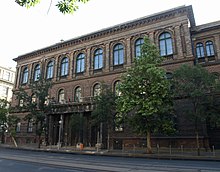Loading AI tools
Faculty of Eötvös Loránd University, Budapest, Hungary From Wikipedia, the free encyclopedia
The Faculty of Humanities is the oldest faculty of Eötvös Loránd University in Józsefváros, Budapest, Hungary.[1] It was founded by the Cardinal Archbishop of Esztergom Prince Primate of Hungary, Péter Pázmány, in 1635.
ELTE Bölcsészettudományi Kar | |
 The main building of the Faculty of Humanities. | |
| Established | 1635 |
|---|---|
| Dean | Dávid Bartus |
Academic staff | 589 |
| Students | 6960 |
| Address | 4 Múzeum körút , , 1088 , |
| Campus | Urban |
Sporting affiliations | Budapesti EAC |
| Website | btk.elte.hu |

The Faculty of Humanities of the Eötvös Loránd University was founded by Péter Pázmány, Archbishop of Esztergom, on May 12, 1635. The university was operated by the Society of Jesus and it consisted of two faculties: The Faculty of Humanities and the Faculty of Theology. At that time, students could obtain three academic titles: Bachelor's degree, Master's degree, and Doctor of Philosophy.
In 1770, the Faculty of Humanities adopted the reforms introduced at the University of Vienna. The university then became state-owned, and a dean and a director of the Faculty were appointed to monitor its functioning. In 1777, the Faculty of Humanities was moved to Buda, the western part of today's Budapest, along with the faculty of Theology and the Faculty of Law. However, the faculties were moved back seven years later.
The late 18th century also saw changes in the university. The changes closely followed the pattern employed at the University of Vienna, but the language of teaching remained Latin until 1844. The Hungarian Revolution of 1848 leading to a university reform program designed by József Eötvös in 1850, being implemented.
The Faculty of Primary and Pre-school Education was established in 2000. The Faculty of Psychology and Education and the Faculty of Sociology were created in 2003.[2]
In 2018, Viktor Orbán's chief of staff announced that government would no longer finance any university programmes on gender studies.[3]
In 2018, many institutes of the Faculty expressed their solidarity with the George Soros-founded Central European University.[4]
On August 12, 2019, the Faculty's former student and professor, Agnes Heller, died.[5]
On September 5, 2022, the Dean of the Faculty announced that the autumn break would be postponed to December and the exams would be held online due to the energy crisis caused by the Russo-Ukrainian war.[6]
The Faculty of Humanities consists of 16 institutes:[7]
| Institute of Ancient and Classical Studies[8] | Institute of Archaeological Sciences[9] |
| Institute of Arts Communication and Music[10] | Institute of Art History[11] |
| Institute of East Asian Studies[12] | Institute of Ethnography and Folklore[13] |
| Institute of Germanic Studies[14] | Institute of Hungarian Linguistics and Finno-Ugric Studies[15] |
| Institute of Hungarian Literature and Cultural Studies[16] | Institute of Historical Studies[17] |
| Institute of Language Mediation[18] | Institute of Library and Information Science[19] |
| Institute of Oriental Studies[20] | Institute of Philosophy[21] |
| Institute of Romance Studies[22] | Institute of Slavonic and Baltic Philology[23] |
| Institute for The Theory of Art and Media Studies[24] | School of English and American Studies[25] |
The current leadership consists of 1 dean and 4 vice-deans.[26]
The following people were awarded with Honorary titles by the Faculty of Humanities.[28]
Currently, there are twenty-four research centres at the department level, institution level, and faculty level.[29]



The Faculty has one main library, located in Trefort Garden,[32] and 13 libraries at institutional levels. The Institute of Romance Studies has libraries at the departmental level.
The library of Medieval Studies of the Central European University was located in the building of ELTE's Faculty of Humanities.[33]
Seamless Wikipedia browsing. On steroids.
Every time you click a link to Wikipedia, Wiktionary or Wikiquote in your browser's search results, it will show the modern Wikiwand interface.
Wikiwand extension is a five stars, simple, with minimum permission required to keep your browsing private, safe and transparent.